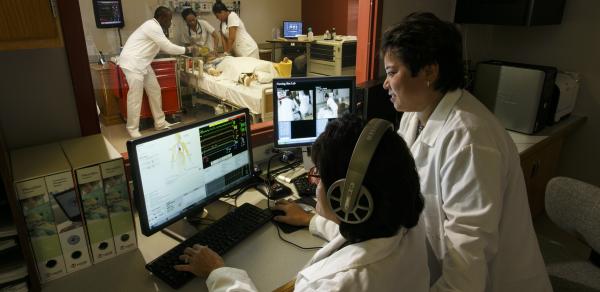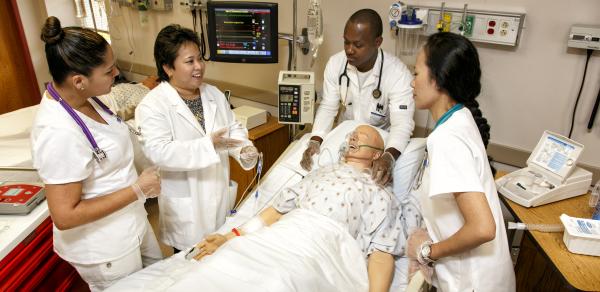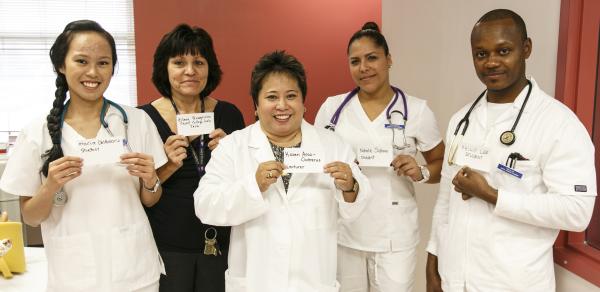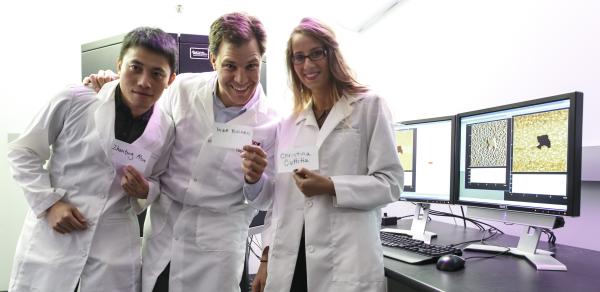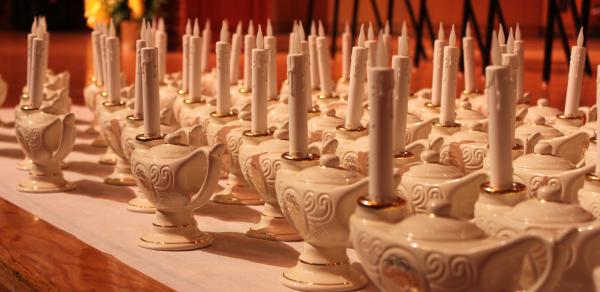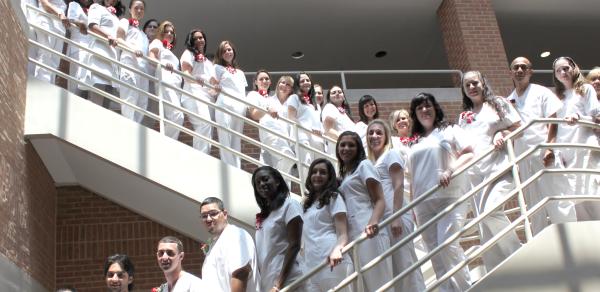Department of Nursing - History
The '60s: The Dawn of a Program
Staten Island Community College (SICC), of The City University of New York (CUNY), began offering an Associate in Applied Science degree (AAS) with a major in nursing in 1965. The AAS nursing program was located at the original SICC campus on Bay Street in Staten Island, New York. National League for Nursing (NLN) accreditation was sought upon graduation of the first class of students. Full accreditation was received and has continued throughout the progress of the program. The College moved to the new and modern Sunnyside Campus at 750 Ocean Terrace in 1967. At that time, the Nursing Department was the recipient of "state of the art" laboratories and equipment.
The '70s: New Growth
The merger of SICC and Richmond College in 1976 formed a senior college--The College of Staten Island (CSI). The faculty of the nursing department began to explore the possibility of offering a baccalaureate degree in nursing. The addition of this degree would enable graduates of AAS and diploma programs in the area to continue their education in the borough of Staten Island. A Bachelor of Science degree with a major in nursing was initiated at CSI in 1982. National League for Nursing (NLN) accreditation was sought upon graduation of the first class of students. Full accreditation was received and has continued throughout the progress of the program.
The '90s: Scholarly Visions
Once CSI became a BS degree-granting program, the Department was able to apply for membership in Sigma Theta Tau, the International Honor Society of Nursing. A new Chapter, Mu Upsilon, was established and chartered in April 1992. Chapter activities have brought many honors to the College and the Department.
With establishment of the new CSI Willowbrook Campus, the Department of Nursing moved in Fall 1993 to Marcus Hall, Building 5 South, 2800 Victory Boulevard. Since then, there have been steady improvements at the CSI campus and the Department of Nursing. The main office of the Department is located in Room 213 of Building 5 South. Faculty offices are on the first and second floors of the same building. The building has several practice laboratories and learning resource areas. Additional information can be found on Bulletin Boards posted on the walls of the second floor of the building, outside of Room 213.
2000: A New Century; New Growth in Excellence, Scholarship & Leadership
The year 2000 marked another milestone for the Department of Nursing. A Master of Science in Adult Health Nursing was initiated, providing for Clinical Nurse Specialist preparation in Adult Health. The new program admitted its first students in Spring 2000. The program received a Federal grant of $637,000 to provide resources for meeting program goals. In 2002, a Masters in Gerontological Nursing, with preparation in the role of Gerontological Clinical Nurse Specialist was added. In 2003, the program expanded to offer additional options: Clinical Nurse Specialist (CNS) and Clinical Nurse Specialist/Nursing Practitioner (CNS/NP), each in Adult Health or Gerontologic Nursing. Post-graduate programs offered for nurses holding master's degrees include the Advanced Certificate in Adult Health Nursing and the Advanced Certificate in Gerontological Nursing. In 2008, an online Advanced Certificate in Cultural Competence was offered, the first of its kind in the nation. Candidates in these programs are prepared to meet the requirements for certification as adult or gerontological nurse practitioners by New York State and additional national credentialing organizations. The Department is also proud of the contributions of its faculty. The faculty have a rich tradition of accomplishments. They publish texts and articles, conduct research, speak at local, national and international conferences, and receive a variety of grants that benefit the Department and its students. In 2009, the High-Fidelity Simulation Center was dedicated. This undertaking was enhanced by funding from Staten Island’s New York State Senator Lanza.
Recognizing the importance of collaboration and partnership, the Department formed an Advisory Board consisting of alumni, students, friends, and colleagues from the community who work with faculty to help chart the course of nursing programs into the new century. The Board meets annually to discuss issues of importance and to help identify the needs of our community.
Also in this decade, a long-time vision of the Department faculty was the initiation of a doctoral program in nursing. Together, the nursing faculty from CSI, Hunter, and Lehman Colleges collaborated to develop a Doctor of Nursing Science (DNS) research degree to be offered at the CUNY Graduate Center. The vision was realized, a consortium model was implemented, and the first class was admitted in 2006.
The Second Decade of the 21st Century (2010 to present): Simulation, Changing Environments, Working to Sustain Excellence
The second decade of the 21st century (2010-present) has been a very active period in the history of the CSI Nursing Department. Three themes offer some insight: simulation, changing environments, and working to sustain excellence. Simulation in nursing education requires resources and frequent updating. During this decade we dedicated the NRS 110 laboratory (5S-215) to Mr. Sam Bass, late husband of a major supporter of Nursing, Mrs. Bass. To add to the clinical laboratories and to enhance education for the care of older adults, funding was sought to establish a lab for the Care of Older Adults. The Brooklyn Home for Aged Men was most supportive of the Nursing Department and provided key funding for the laboratory which was dedicated in 2012. The laboratory is set up as a studio apartment with space for high, moderate, and low fidelity clinical simulation opportunities. The CUNY Dean of Health and Human Services provided additional funding for telehealth equipment which allowed for practice of 21st Century community and primary care technologies.
In the age of simulation and increasing importance of educational technologies, many faculty completed a year-long program focused on transforming educational use of technologies by CUNY Nursing Faculty. The program provided for multi-year sessions through a million dollar grant directed by Dr. Joyce Griffins-Sobel and later Dr. Donna Nickitas both of Hunter College.
CSI Nursing faculty along with nursing faculty from all the CUNY colleges with nursing programs attended sessions presented by national leaders on topics including educational technology, social media, high fidelity simulation and standardized patient use. The faculty collaborated on projects and presented posters about the projects. At the completion of the program the faculty participants were deemed, Transformer Scholars. The majority of nursing faculty at CSI are Transformer Scholars and are well prepared in the area of simulation and the use of technology. In addition to these efforts, faculty sought out other opportunities to provide students with the most up-to-date equipment and pedagogies to prepare them for 21st Century practice and beyond. The Nursing Faculty continue to disseminate innovative pedagogical practices in the area of simulation and use of technology in teaching at local, regional, and national conferences.
Changing environments are evident in many aspects of educational life at the CSI Nursing Department. In keeping with the discipline and state and national trends the Graduate Programs were renamed and two distinct tracks were established, Masters in Adult-Gerontology Health – Clinical Nurse Specialist and Masters in Adult-Gerontology Health – Nurse Practitioner. In addition, a new graduate program, Doctor of Nursing Practice (DNP), was developed by the CSI nursing faculty. It was approved at the CSI, CUNY, and State levels; the approval would include the milestone that CSI would grant the clinical practice doctoral degree. Only Physical Therapy and Nursing are currently approved to grant doctoral degrees from CSI. Other changes that reflected national trends occurred at the DNS program at the CUNY Graduate Center. The consortial nursing faculty agreed upon a proposal to transition the DNS to a PhD degree program, which was subsequently approved. Changing environments and sustaining excellence demands research and evidence-based practices. CSI Nursing Department faculty research interests and publications include topics such as nursing education, simulation, pediatric nursing, cancer survivorship, hospice and palliative care, interprofessional teams, end of life issues, health literacy, social support, instrument development, use of social media, cultural competence and transcultural self-efficacy, and global health issues. They mentor a variety of students in their doctoral dissertations, research practicums, masters projects, and undergraduate research projects, as well as within the context of independent studies.
There have been a number of scholarship opportunities that have been available for CSI nursing students in all our nursing programs as they pursue their educational paths. In addition, to their funding of the Laboratory for the Care of Older Adults, the Brooklyn Home also established a series of scholarships for nursing students, which continue to assist students in their educational pursuits. There are other named scholarships and philanthropic efforts to support students that have been provided by alumni, faculty, and community benefactors. The Nursing Department faculty and students are most grateful for the generosity of our funders and for the opportunities they provide for our students. The Nursing Department continues to support Mu Upsilon Chapter of Sigma Theta Tau International. The Chapter will be celebrating its 25th Anniversary year in 2017. Mu Upsilon inducts undergraduates in the top 35% of their class, graduates students with grade point averages of 3.5 or higher, and nurse leaders. The Chapter engages in many scholarly, philanthropic, and service activities. They provide graduation awards for our CSI students, offer research and clinical programs, and awards, scholarships, and research grants for members who are overwhelmingly our students, alumni, or faculty. The opportunities available through Mu Upsilon Chapter contributes to sustaining excellence.
CSI has been on the move to grow programs, create new learning opportunities, and prepare the scholars and professionals of the future. One change relevant to these visions included structural changes. The Nursing Department collaborated with the Physical Therapy Department to propose a school structure. Although there were discussions about the title of the new school, in the spirit of collaboration and interprofessional proliferation, the school is named the School of Health Sciences with the inaugural departments being Nursing and Physical Therapy. The School of Health Sciences was founded in Fall 2014. Interim Founding Dean, Maureen Becker has lead the School’s earliest development and in Fall 2016 the Social Work Department joined the School of Health Sciences.
The CSI Nursing Department has been active in engaging simulation, leading in a changing environment, and working to sustain excellence. Our admission policies are designed to admit students with a good potential for success. Faculty work diligently to ensure an up-to-date curriculum with the leading edge technologies to prepare students for a nursing career. Opportunities for our AAS students to enhance success in the program and prepare for NCLEX success for our AAS students have continued to grow. AAS students are assigned Student Success Coaches, Peer Tutor Mentoring, and sessions on test/exam preparation are all available at the Department. In addition to the many exam preparatory approaches, we offer milestone testing at each level of the AAS curriculum, comprehensive practice and diagnostic exams that help to gauge potential success on licensure exams, and arrange an in-person NCLEX review in preparation for the licensure exam for graduating AAS students each semester. Our RN to BS students receive a variety of innovative learning experiences within the community, related to nursing leadership and management in patient care, and in study abroad opportunities. Our undergraduate students have had increasing opportunities to engage in research activities and present at local, regional, national, and international venues. The graduate programs provide many opportunities for certification success and career advancement. The Nursing Department continues to engage in continuous program evaluation and accreditation to ensure the best environment for excellence. Although our nursing accrediting body has gone through a transition, we continue to be an accredited program by the Accrediting Commission for Education of Nurses (ACEN), a nationally (Department of Education) recognized nursing accrediting body formerly known as the National League for Nursing Accreditation Commission. (NLNAC).
We have "come a long way" from those early days on Bay Street to our present home in Marcus Hall and as Department within the School of Health Sciences. Our reputation for having quality programs is strong within the College, the community, and the City University of New York. Our graduates are employed in a variety of institutions and agencies throughout the city, state, and other parts of the country. Our graduates bring honor to the College. As CSI celebrates the 60th Anniversary (2016-2017 Academic Year) of excellence in education and we look forward to future decades, the Nursing Department of the School of Health Sciences at CSI looks forward to continuing to meet the higher education needs of our students for the benefit of people within the communities we serve and beyond, our clinical partners, and to the profession of nursing.
